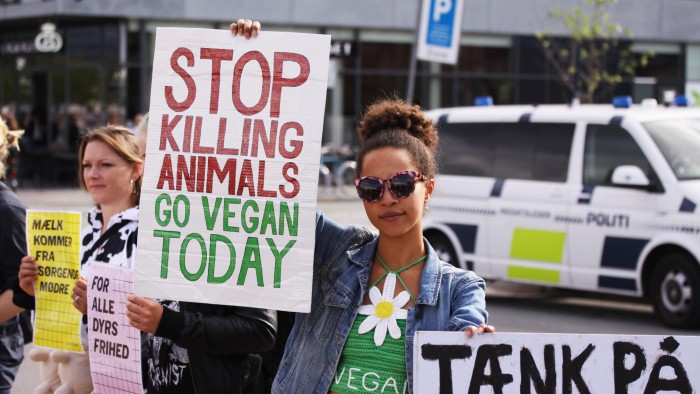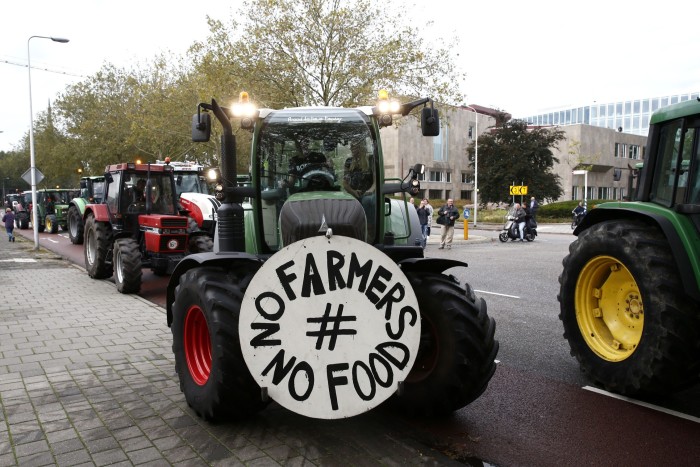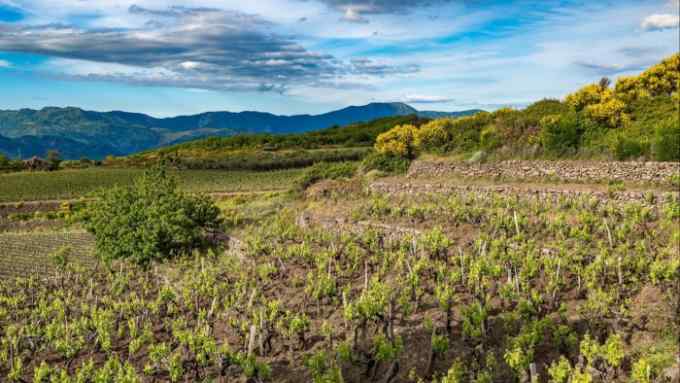Denmark leads the way in incentivising low-meat diets

Roula Khalaf, Editor of the FT, selects her favourite stories in this weekly newsletter.
Scientists are increasingly clear: if the world wants to reduce greenhouse gas emissions, it needs to eat less meat.
But the message has not got through. Politicians — who, in several countries, have set targets for phasing out petrol cars and gas boilers — have been reluctant to do anything similar for what we eat.
“We’re not on course to reduce meat and dairy consumption,” says Lewis Bollard, a farm animal expert at charitable foundation Open Philanthropy. “Americans and Europeans are eating less beef and pork than before, but they’ve more than compensated with more chicken and eggs.”
Global meat consumption is set to rise 14 per cent by 2030, compared with 2018-2020, forecasts the UN’s Food and Agriculture Organization.
A few countries are beginning to embrace change, however. Denmark has perhaps gone furthest. In 2021, it updated its official dietary guidelines, recommending that adults eat just 350g of meat a week (equivalent to about three hamburgers), in line with proposals from the scientific EAT-Lancet commission.
Last October, Denmark also became the first country to publish an Action Plan for Plant-based Foods, which called plant-based (vegan) foods “the future” and set out steps to increase both the supply and demand. The government initially allocated DKr675mn ($98mn/£78mn) for a fund for promoting plant-based food. In addition, it is committed — at least in theory — to introducing a carbon tax on agriculture.
Denmark’s pioneering role may seem counterintuitive, given that many Danes have a deeply held love of pork, of which it is also one of the world’s largest exporters. But the country has a tradition of finding common ground, says Rune-Christoffer Dragsdahl, secretary-general of the Vegetarian Society of Denmark: “People try to collaborate, even with those they disagree with.”
So, in recent years, the Vegetarian Society first partnered with organic farmers and then with Denmark’s main farming lobby group. They found that they could agree on the economic opportunity of promoting organic, plant-based products.

Some farmers were happy to “develop a plan B”, even if they remained committed to a plan A of continuing meat production, says Dragsdahl. In their minds was the country’s success as an early developer of wind power. “We said, let’s make this the new wind turbine adventure for Denmark.” Once farmers’ groups were on board, political unease dropped away.
In other countries, though, the transition has been more confrontational. Dutch farmers mounted fierce protests over proposals to reduce livestock numbers, intended to bring down nitrogen pollution. Italy’s right-wing government has backed a ban on cultivated (laboratory-grown) meat, which it says would be an attack on the country’s culture and farmers.
In the UK, in 2021, the then prime minister Boris Johnson dismissed the National Food Strategy — an independent review that had been set up by the government and which recommended a 30 per cent reduction in meat consumption by 2032.
And the current prime minister, Rishi Sunak, sought to boost his political fortunes by promising to veto a meat tax, even though none had been seriously proposed.
Britain’s National Farmers’ Union has also pushed back at scientific calls for a change in diet. “What we eat is a personal choice,” says its deputy president Tom Bradshaw. “Blanket policies to reduce meat consumption can massively oversimplify a complex topic because it puts all meat into one category.”
The NFU argues that grazing is climate-friendly because it builds carbon in the soil. That claim is viewed sceptically by many scientists, but has widespread support among farmers. “I’d go to jail before I paid a carbon tax on my cows,” says one British farmer, who asked not to be named.
“I think many politicians are afraid of the meat industry,” says Bollard of Open Philanthropy. He points out that the EU dropped proposals for encouraging people to eat less meat from its strategy for making the food system sustainable, known as ‘Farm to Fork’.
The best hope, say those hoping for change, is to focus on carrots rather than sticks — such as funding for research into new fermented foods.
For example, Germany’s 2024 budget includes €38mn for promoting plant-based foods. Similarly, the UK has committed £12mn to a cultivated meat initiative led by the University of Bath. However, this is a fraction of what is needed to make the country a leader, says Linus Pardoe, UK policy manager at the Good Food Institute Europe, which promotes alternatives to meat. Pardoe calls for simpler licensing for cultivated meat and for laxer rules on labelling alternative dairy products (in the UK, as in the EU, “oat milk” is currently not a permitted term).
While national politicians stall, other actors can lead the way. Supermarkets, which are committed to reducing their emissions, “have the capacity to move the needle” by changing what they sell, says Pardoe.
In the US, “the most plausible next step is to focus on state and city governments that are leading on climate efforts,” says Bollard. New York City, whose mayor Eric Adams has advocated a mainly meat-free diet, “has adopted a pioneering set of reforms, including making plant-based meals the default in public hospitals and two days per week in public schools”.
Key to Denmark’s approach has been to fund both high-tech and low-tech solutions: from new fermented products to teaching chefs how to cook with vegetables and pulses.
But carrots alone are unlikely to be enough. Agriculture is on course to account for 40 per cent of Denmark’s greenhouse gas emissions in 2030, the government’s climate advisers estimate. “I would argue that you do at some point need a stick,” says Dragsdahl of the Vegetarian Society.
In Denmark, the next step is a carbon tax on agriculture, with a proposal due in the next few months. This is likely to be politically contentious, — especially for beef farmers. But the good news is that, once rich countries make the transition, that may cause ripples worldwide.
“People aspire to what rich people eat,” says Dragsdahl. “It does matter what we eat in Denmark, Scandinavia, UK, US, because many parts of the world orient themselves towards that.”
Climate Capital

Where climate change meets business, markets and politics. Explore the FT’s coverage here.
Are you curious about the FT’s environmental sustainability commitments? Find out more about our science-based targets here

Comments